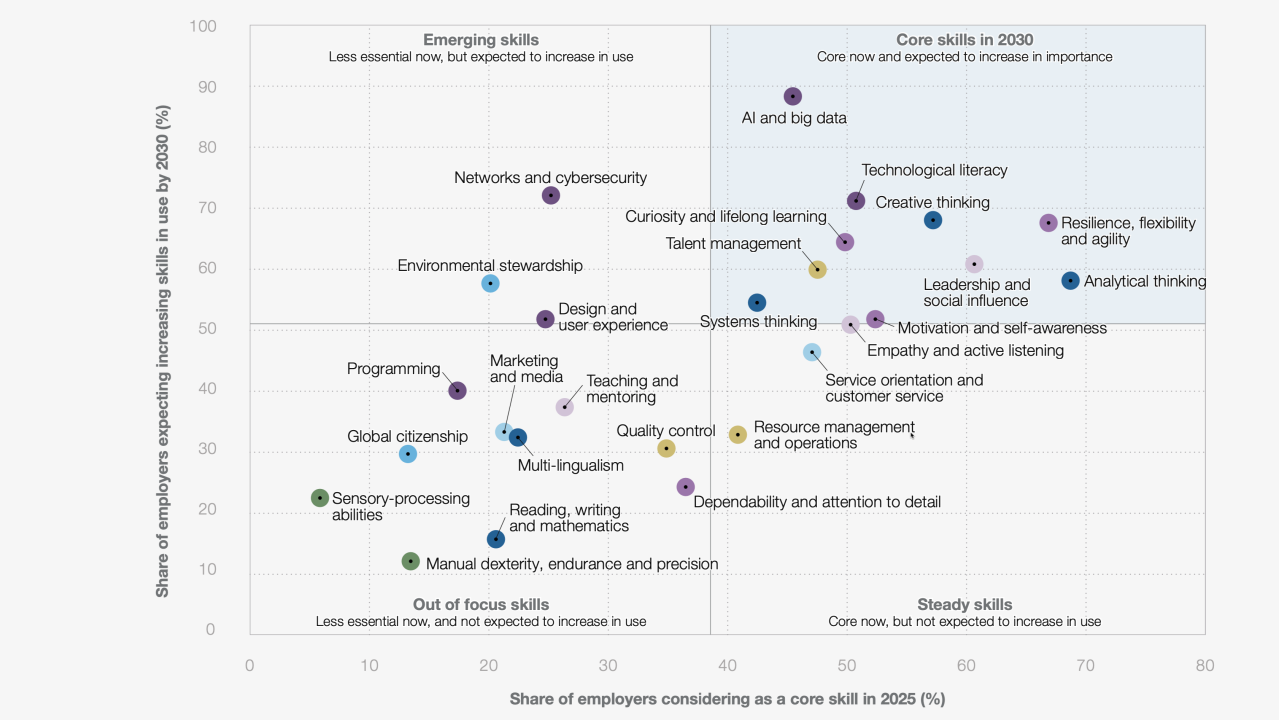
As AI and digital technologies reshape industries across the board, individuals, not just companies, are under pressure to adapt. The World Economic Forum’s (WEF) Future of Jobs Report 2025 outlines what’s coming and what you can do today to stay competitive.
This post focuses on two areas: understanding the rise of AI and big data, and preparing yourself for a significant shift in the skills that matter most.
1. AI and Big Data Are Reshaping Every Career Path
AI is no longer something only data scientists and software engineers need to think about. The WEF report forecasts a 34% increase in AI and machine learning roles by 2030, and 75% of companies expect to adopt AI, big data, and cloud technologies within five years.
What does that mean for you?
- You don’t need to become an AI expert, but understanding how AI works, where it’s used, and its limitations will help you stay relevant.
- Roles across marketing, HR, finance, operations, and healthcare are being transformed by data. Learning how to interpret data and use AI-powered tools will become a core skill in many careers.
The WEF emphasizes the need for strong frameworks around the responsible adoption of AI. As AI becomes central to business and society, ethical awareness, transparency, and trust in systems will be critical skills across all job functions.
If you haven’t already, consider exploring tools like:
- Intro courses in AI or data analytics (offered on platforms like Coursera, edX, or LinkedIn Learning)
- Reading up on the ethical implications of AI in society
2. 39% of Skills You Use Today May Be Obsolete by 2030
The pace of change isn’t slowing down. According to the WEF, nearly four in ten core skills used in today’s jobs could be irrelevant by 2030. And only half of workers currently have access to the kind of training they’ll need to adapt.
The fastest-growing skills for the future include:
- Analytical thinking
- Creative problem-solving
- Technological literacy
- Curiosity and lifelong learning
But it goes deeper. The WEF warns that while job numbers will grow globally by 2030, the mismatch in skills between rising and declining roles could widen existing gaps.
It is jaw dropping what the report ask us to imagine. Let us visualize the global workforce as 100 people: 59 of them will need reskilling by 2030. Of those:
- 29 can be upskilled in their current roles
- 19 can be trained and moved to new roles internally
- 11 may not receive the training they need—putting their future at risk
That’s why it’s essential to take ownership of your growth now. Companies are planning to:
- Prioritize upskilling (85%)
- Hire people with new skills (70%)
- Transition staff from declining to growing roles (50%)
But they’re also planning to reduce roles that no longer match evolving skill demands (40%).
We are in a rollercoaster of a time and now is the time to future-proof your skillset:
- Make learning a regular habit—commit to one course, article, or video per week.
- Join online communities or local meetups where you can share knowledge and learn from others.
- Look for stretch assignments or projects at work that push you outside your comfort zone.
As the Search Engine Journal put it: "The rapid pace of change means companies must be as agile in developing human capital as they are in deploying new technologies." That agility starts with you.
The report also notes that 63% of employers consider skills gaps the biggest barrier to transformation, and 85% plan to prioritize upskilling. There’s growing support for reskilling, including a focus on well-being, inclusion, and improved career progression.
Encouragingly, 64% of employers cite employee well-being as a key strategy for attracting talent, and 83% have adopted diversity, equity, and inclusion (DEI) initiatives, up from 67% in 2023.
Final Word
The future of work isn’t something far off—it’s already happening. You don’t need to predict the next big thing to thrive, but you do need to be proactive, curious, and open to change.
The good news? You don’t have to do it all at once. Small steps—consistently taken—can position you for opportunities you haven’t even imagined yet.
Further Reading:
#FutureOfWork #CareerGrowth #LifelongLearning #DigitalSkills #AI #BigData #Upskilling #Reskilling #JobMarket